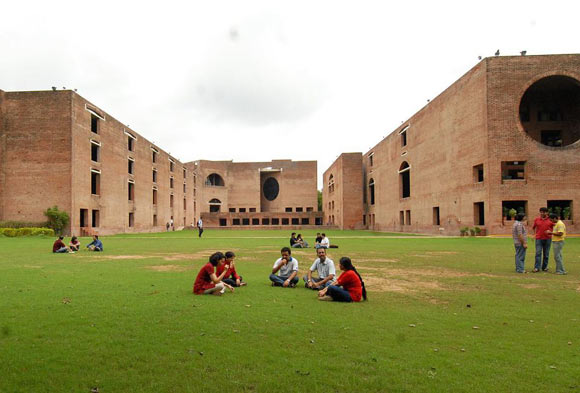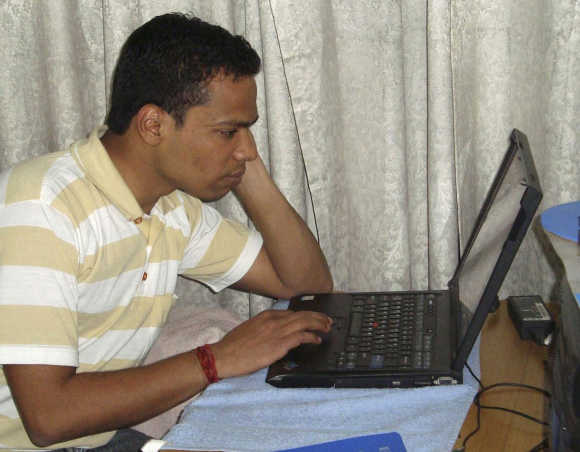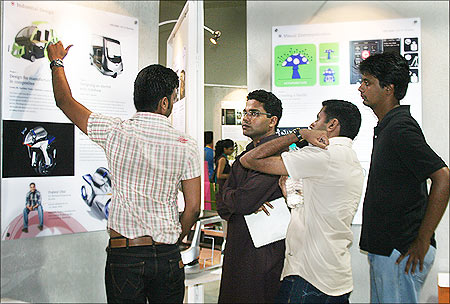Photographs: Jonathan Alcorn/Reuters Dr V Panduranga Rao
Find out why you must look beyond fancy placement reports and global b-school rankings while picking an MBA institute
It is that time of the year when MBA aspirants spend hours and days looking for the 'perfect' b-school.
A lot of time is spent looking at placement reports, courses offered and the city where the college is located.
Thousands of b-school aspirants across the country follow the above trend and also pass it on to future generations.
So, if you are among those who is following amateur peer advice, chances are you're putting your career at risk.
Read on to find out where you're going wrong about the selection process and why you must be extremely careful about picking the right MBA institute for you...
1. Rankings
There are various magazines, newspapers and websites that offer rankings, both at the national and international level.
In fact, there are so many of these published during the course of the year that students do not know which one to trust!
Rankings, we all know, are purely indicators of a school's reputation weighed against others, but there are several other factors that need to be taken into consideration.
Thorough research should be done before finalising a b-school.
In case you are not aware, there are many b-schools that offer industry-specific and flexible courses (MBA in healthcare, marine management to name a few) but have a lower overall ranking.
Dr V Panduranga Rao is Director, Institute of Management Technology, Hyderabad
Please click NEXT to continue reading...
2. Age of the school
Image: The year of establishment of an institute is no guarantee that it offers the best programmes.Photographs: Wikimedia Commons
The quality of a school is not always directly proportional to its age.
The myth that an old institute is a good one might not be true always and should not be a benchmark.
While established schools may not necessarily live up to the current market trends, a number of new schools are raising the bar thanks to their revised syllabi, live projects and student exchange programmes.
Before applying, one should verify whether or not the school has been able to transform itself in terms of faculty qualifications and industry experience, pedagogy, infrastructure, courses, industry interactions, etc.
3. Career choice
Image: Be sure why you want to do an MBA in the first place.Photographs: Courtesy Careers360.com
Often students perceive b-schools through large organisations, which are prospective recruiters at the school.
Flashy names always attract a prospective student towards an institute.
However, before making a decision to pursue a course, a student should be clear about what he wants to do once the course is over.
For example: Are you really sure why you want to do an MBA in finance/marketing?
4. Programmes
Image: Avoid choosing a specialisation that doesn't match your interest or aptitude.Photographs: Kshitij Anand/Reuters
Many reputed institutes offer a host of popular programmes under MBA.
Students generally tend to choose any stream once they secure admission into a reputed institute. This is among the most common mistakes.
Choosing a specialisation merely by the name of a b-school should be avoided.
As mentioned in the previous point, students should always know what they want from their careers and choose an institute that best offers that.
Opt for an institute that offers multiple choice of programmes. It may also be a good idea to look at the electives being offered in your area of interest before you consider applying at any institute.
All good schools have details of the courses/programmes they offer on their website.
Communication with the Programme Office will also help you understand this.
In addition, the manner in which these courses are offered is important. Some schools have a fixed basket while others are more flexible and offer a cafeteria approach.
5. Qualification v/s Skill
Image: More than a degree, an MBA is a skill building programme.Photographs: Rediff Archives
An MBA programme is not just another qualification, which will act as a gateway to better jobs.
Very few aspirants perceive the MBA programme as an opportunity to upgrade their skills and cater to the demands of the industry.
As a result, most students end up getting regular jobs, which they could have even without an MBA.
Students should understand that they are enrolling themselves into a business administration programme to enhance both their knowledge and skills.
It is also important to judge a programme by its ability to internationalise and give a global perspective.
How often does the school have immersion or exchange programmes? How effective is it? Have you bothered to find out?
Most schools have an international programme office that should be able to offer advice on the matter.
6. Full Time v/s Executive MBA
Image: Choose an MBA programme that best fits your needs and requirements.Photographs: Reuters
A majority of working executives view the MBA as an attractive option that will open new doors in their career.
The decision for them gets tricky when they have to choose between a full-time and executive MBA.
For those who are applying for an executive MBA through the organisation they're working in, a lot of rules and regulations come into play.
For instance, if the company you're working in has a tie-up with a particular institute, you may feel at loss for lack of options to choose from.
In most cases, if the company is funding your MBA, you will have to sign a contract stating that you will resume your service with the company for a fixed number of years after completing your education.
So, if you don't want to adhere to the rules, you should rather quit your job and opt for a full-time course where you at least get to make your own decisions.
It is important to ensure that one does not choose a programme solely on the basis of getting a career break.
In fact, the decision should allow you to cross a milestone that helps accelerate knowledge, learning and growth.
7. Expensive courses
Image: For any programme you choose, check for return on investment.Photographs: Jayanta Shaw/Reuters
Students generally are of the opinion that more the money spent on a course, the better its returns will be.
It would be a good idea to research with your seniors at high school and graduates from the school you wish to apply about the return on investment.
8. Placements
Image: Placement reports of institutes need to be analysed carefully for relevant job profiles.Photographs: Krishnendu Haldar/Reuters
Showy numbers such as the percentage of students placed and average salary tend to mesmerise students almost instantly.
In fact every other b-school presents an optimistic picture.
A candidate should not make a decision solely on such figures.
Applicants should also consider the job profiles offered to the graduates at the end of the course and not be carried away by the fancy remuneration offered.
9. Student mix
Image: Go for a school that offers a healthy mix of students in its class.Photographs: Rediff Archives
Students often have a tendency of mixing with fellow students of similar academic and regional backgrounds.
They assume that if a b-school has a large number of commerce graduates compared to those from an engineering background or more arts students than science, they might get overlooked.
This is never the case.
A management education aspirant should understand the importance of working with people from different streams.
This is because an MBA is not just about studies but also about gaining new experiences and networking.
Moreover, working with different sets of students provides a broader view of solving a problem and coping with challenges that come up in real life.
A healthy MBA class involves students from different cultural backgrounds, educational diversity, regions and languages and with varying degrees of experience.
10. Pedagogy
Image: Give importance to institutes that promise out of classroom experiences.Photographs: Satish Bodas/Rediff.com
An interactive pedagogy, which involves case discussions, application of concepts, and interaction with industry professionals is one that helps improve the learning curve and offers faster growth.
While most institutions claim they offer you the best, check for quality of course content.
Ensure you choose an institute that offers maximum live projects and industry relevant experiences.
Most companies, which visit campuses for recruitment exercises want candidates to be able to apply concepts learnt, visualise the market from a different perspective and not just follow the herd.
At the expense of sounding cliched, in a competitive environment, it is very important to be different.
This makes a lot of sense when you are competing with thousands of people with similar talent.
Today, India is witnessing many talented young people launching entrepreneurial ventures.
With a growing sense of importance towards higher education, a lot of the urban population looks at business administration as a gateway to a brighter future.
However, what these students lack while making these important decisions is proper guidance.
A little bit of research, some extra effort to weigh one option over another can make a sea of difference to your career.











Comment
article